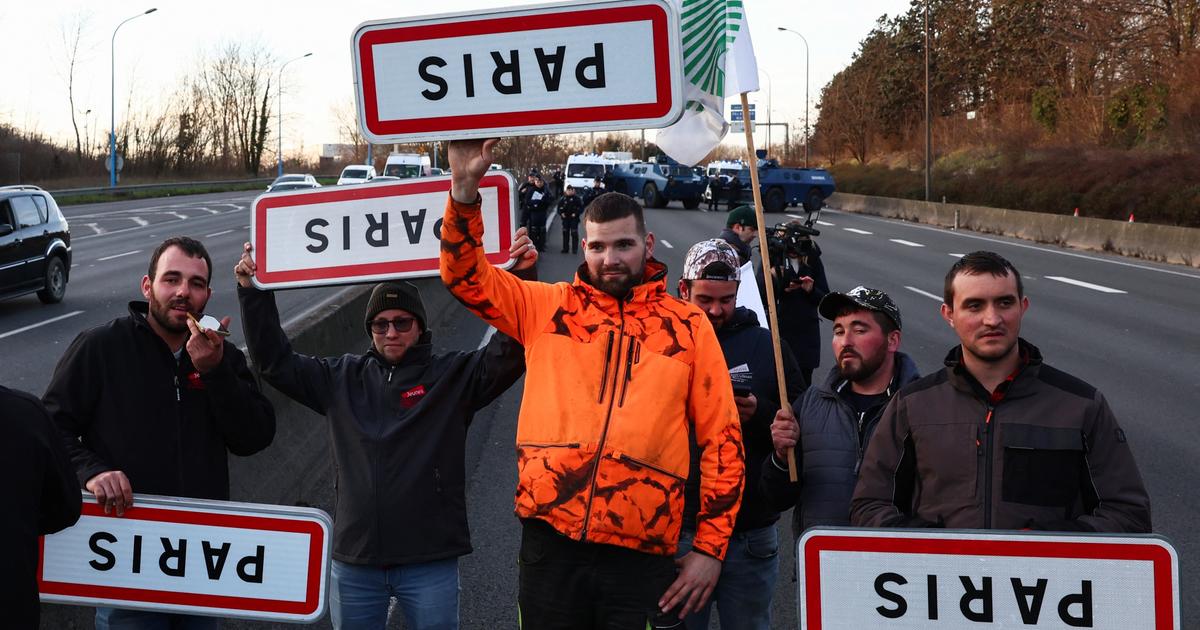In the secrecy of the ballot box, do farmers have a favorite political color?
While Gérald Darmanin assured that he had
“compassion”
for the
“legitimate bloodshed”
of farmers, that Jordan Bardella castigated a
“progressive rural erasure”
and that Éric Zemmour called to
“not let them die”
in the face to
"predators"
like
"the European Commission"
, the farmers' vote is more contested than ever in the midst of the social movement and in the run-up to the European elections next June.
And this, despite the impressive reduction in the number of agricultural operators over the last 40 years, going from 1.6 million at the start of the 1980s to less than 400,000 today.
But if farmers currently represent around 1.5% of the active population, their electorate, also bringing together employees and retirees, accounts for up to 8% of the electorate.
Traditionally, the hearts of farmers therefore lean to the right above all, a moderate right, as multiple studies by sociologists and pollsters on the issue have shown.
In 1995, in a major survey on the subject, the Science Po research center noted that
“all the indicators”
confirmed this trend.
“On the seven-position SOFRES scale, 80% classify themselves in the center or on the right, while the proportion is only 61% in the entire population
,” note the authors.
Also read “We must stop annoying farmers”: the right unveils its white paper to respond to the crisis
“Whether they run a shop or work the land, whether they run a business or exercise a liberal profession, they are wary of a left perceived as interventionist and protective of employees' rights
,” they also add, analyzing a related divide to the status but also to the particularities of agricultural sociology which continued
“throughout the Fifth Republic”
.
Rural and Catholic environment
At the end of the previous century, in fact, integration into the Catholic community and its values on the one hand, and the importance of their heritage, as well as a high average age on the other hand, were decisive in this balance. to the right.
The peasant population is made up mainly of independents, attached to the values of work and meritocracy, with a suspicious relationship with the State.
They are older than the average, are more likely to own property, and are more religious than the general French population.
“So many factors which incline them towards conservatism”
, also reports the analysis.
“The Catholic Action movements deeply influenced the two generations of farmers from the post-war period until the 1990s
,” explains sociologist Bertrand Hervieu, research director at the CNRS.
“These movements were marked by social Catholicism which does not accommodate an orientation towards the extreme right
,” also adds the specialist in rural issues.
The agricultural world has more connections with Christian democracy and, at the time, the MRP.
“When General De Gaulle, who was extremely suspicious of this environment because of his adhesion to Vichy, came to power, he forged, with the Catholic Action movements, the modernization laws of 1960 and 1962. There was then a real rallying to Gaullism then to Chiraquismo
,” explains Bertrand Hervieu.
Progress of the National Rally
Today, however, and over the past twenty years, a new phenomenon has emerged.
“The dike facing the extreme right is breaking
,” reports Bertrand Hervieu.
In the 1990s, the agricultural world was one of the least receptive to the National Front's discourse.
But in 2002, on April 21, farmers supported Jean-Marie Le Pen by 22%, or 5 points more than the national average, marking the beginning of a change.
After the Maastricht earthquake in 1992, a Pasqua-Villiers sovereignist list had already attracted part of the electorate.
It is now a hotly contested reservoir within the entire right.
In 2012, farmers voted for Sarkozy in the first round of the presidential election at 44% (compared to 27% for all French people) and for Le Pen at 19.5% (compared to 17.9%).
In 2017, farmers are divided between Emmanuel Macron and François Fillon (20% each, behind Marine Le Pen at 35% according to a Cevipof survey).
In 2022, an Ifop poll carried out by the FNSEA before the election promises a third of the votes for Macron who is ahead of Marine Le Pen and Éric Zemmour (18.5 and 12.5%) and Valérie Pécresse (10%).
Deep identity crisis
“It is the only professional environment which has gone in a century from an absolute majority in the French population to a simple minority among others
,” explains Bertrand Hervieu.
This upheaval was accompanied by a
“disappointment with politicians”
, a
“feeling of being victims of an economic change linked to globalization”
, a
“feeling of social downgrading”
symptom of a deep identity crisis, noted Jérôme Fourquet in a note published at Fondapol in 2016.
Read alsoBrussels will release ballast on fallow land, scarecrow of the agricultural world
The agricultural world, dechristianized like society as a whole, is also receptive to certain themes dear to the RN such as the fight against growing insecurity or the exasperation of a certain “
punitive”
ecology .
The constant euroscepticism of the flame party also resonates favorably with farmers who suffer under the weight of community standards.
“The RN is one of the rare political forces that has clearly and systematically opposed agricultural free trade agreements
,” explains Giovanni Prete, teacher-researcher at Paris-13, nonetheless pointing out the heterogeneity of the 'electorate.
“I doubt that the grain growers of Beauce or the large landowners of Bordeaux will vote RN…”
.
Whatever happens, a breach has opened, and the National Rally, former National Front initially urban, led by Marine Le Pen who castigated during her first presidential campaign
"the triple A god"
of the financial markets which consider farmers like
“triple nothings”
, intends to rush into it.

